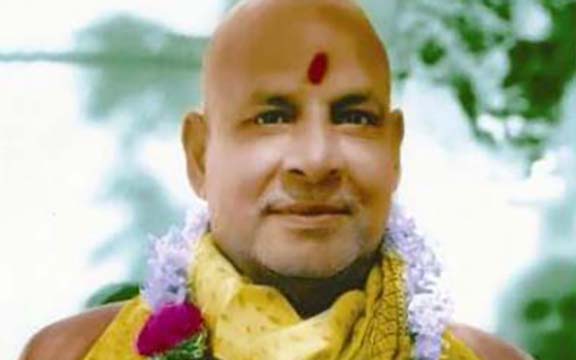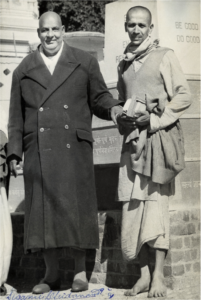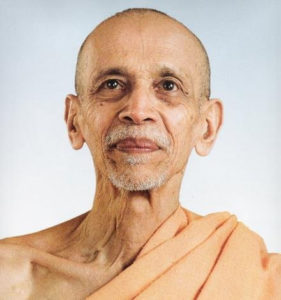
(Photo: His Holiness Sri Swami Sivanandaji)
Let us try to understand that large-hearted person who as it were, at one stroke showered unutterable good fortune on all the seekers. Gurudev [Sri Swami Sivanandaji] was a person on whom honor, homage, tribute, high praise, veneration, respect, etc., were no burden. They were showered on him without affecting his inner simplicity, serenity and humility. They rested lightly on his personality. He did not like to sit on a heavy cushion seat. He would say, “This sort of special seat pricks me. Take it away.” So, if we had put a special seat for him, the first thing that he would do before sitting was to remove it. He would remove it and then only sit.
He had not the habit of delivering lectures or making us sit in front of him and do teaching. No class, no lesson, no personal instructions, no oratory. On three or four occasions, at the supplication of his disciples, he did speak. When he spoke he thundered, he minced no matters, he was forthright and came down heavily, and at the same time he was most inspiring. He swept us off our feet and uplifted us to sublime heights. What were those occasions? They were Guru Purnima, his birthday anniversary on September 8th, New Year’s eve, when he sometimes spoke at midnight.
He gave a written message on every special occasion almost every month. It started with Makara Sankranti message on January 14th, Mahasivaratri in February, Vasant Panchami in March, Rama Navami in April. Also on Hanuman Jayanti, Buddha Purnima, Janmashtami, Durga Puja. But he confined to only three occasions for speaking. Sometimes, he spoke on two other occasions also. The two Sadhana weeks. But that was left to his sweet will. There were two Sadhana weeks during Easter and Christmas holidays. But the schedules of the Sadhana weeks never mentioned any item like “Talk by Gurudev.”
In those days, the early morning prayer-meditation session was at 4 a.m. People were up by 3 or 3:30 a.m. and after bath/wash, etc., they would be present in the Bhajan Hall before 4 a.m. It was all dark outside as well as inside the Bhajan Hall. There was no electricity in those days. There was Akhanda Kirtan of Maha Mantra, so there was like in ancient Greece and Rome an Akhanda Jyoti, a little cotton-wick flame in a small earthen dish. That flame was always there, day and night, in one corner. Except that the rest of the Hall was in complete darkness. The morning prayers started with Jai Ganesh Kirtan, Guru Stotras, Shantipath and all that. Swami Narayanananda, Swami Poornabodhendra, Swami Saswatanandaji Maharaj, Swami Nijabodhananda, they were in-charge of all that just as our Swami Devanandaji is now. Then there was Nama-Sankirtan, reading, etc.
There was no special place or seat for Gurudev, when he came, he sat in one corner like anyone else. No ostentation, no waiting for honor, nor trying to find out a seat. He would quietly sit in a corner and no one would even know it. But as the routine items came to an end, and the Kirtan was about to start, the silence was suddenly broken by very, very loud and long drawn Pranavas “O…m…, O…m…, O…m…” What was that? Gurudev had come and sat in a corner, and suddenly came the loud, long drawn Pranavas, and he drew himself to full height and we found he was towering above us all.
He never liked to deliver a talk sitting, that was not his style. Whenever he spoke, he spoke standing only, as long as he was in normal health up till 1954. After that, he was not keeping well due to old age; he was unable to stand and had no alternative. Even on the stage also, he would deliver his speech standing. We had a Parliament of World Religions in 1953, near the Sivananda Pillar. He pushed back the chair and stood up and talked. He used to say, “I feel free standing, I feel expanded.” No one knew, when su

(Sri Swami Sivananda with Swami Chidananda standing by the Sivananda Pillar, Rishikesh.)
ddenly during his talk, he may do Kirtan raising his hands over head, or even start dancing in a mood of ecstasy! There was no knowing, what mood will carry him off and what he would do next! That was his nature.
He did not like any formalities. Once we were going down after a class. In those days, there were already 22 to 24 wooden steps. A part of the way we had to walk was on a slope and then midway onwards there was a very broad, series of railway sleepers type deodar (Himalayan cedar) wooden steps and they were painted too. While we were going down, Gurudev was pleased to engage us in some discussion about the manuscript of some book. He had a bag in which was the latest part of the manuscript that he had written. As he was talking, he wanted to make out some point by showing me the manuscript. So he simply sat on the steps where he was. He never thought, “I am the founder-head of the Divine Life Society, founder of this Trust, chairman of that Trust, President of that one…” In the middle of the staircase where we were talking, he simply sat in the most natural, spontaneous, informal manner.
I had told you about a very eminent I.C.S. Officer who was a devotee of revered Swami Tapovanji and Gurudev, and who was visiting the Ashram often. After his conversation with Gurudev both of them stepped out of the office. The man was looking here and there for his attendant, because he was in the habit of having his shoes put by his attendant. Gurudev sized up the situation in seconds and immediately brought the shoes and put before the officer. That devotee officer was simply shocked. But Gurudev put him to ease by saying, “No. No matter please.”
Gurudev was spontaneous in his simplicity and humility. It was his normal nature as much as it is of the sun to shine, wind to blow or the water to make something wet. The very next moment he was his normal self. He never thought or felt that he had done something special. As I was present there, I still have the memory of that incident distinctly. It was an object lesson to be cherished, remembered and followed all the life. Sometimes, when this comes naturally to me, it is not Chidananda, but it is Swami Sivananda manifesting in me.
When sometimes someone honored Gurudev or managed to touch his feet, he would say, “Oh! Please, finish this drama too.” For him the whole world and all the outward actions was a drama. But so far as we are concerned, anything said by Gurudev is a genuine teaching, a sort of sermon he gave. He never said, “Oji! Come, I will teach you Vedanta!” He did not hold any class. He did not make us sit and give discourses. However, if we went on looking for it, each little act of his was a lesson. If one understands this, then only they would be able to appreciate what Gurudev has put into us.
Fortunate were those few who were writing his “Day-to-day” (Sivananda, Day-to-day. Vol. 1 to 32.).’ I don’t know who commenced it first, but may be Swami Venkatesanandaji. There were at least eight disciples who wrote it, Swami Atmanandaji, Swami Gurusharananandaji, Yogi Ananda of Trinidad. They were very, very fortunate, because for writing this, they were keenly observing Gurudev and they were absorbed and grasped in these silent teachings of Gurudev. These silent teachings were even more fundamental and deeper than all the books that Gurudev has written.
About the Author:
 Sri Swami Chidananda (24 September 1916 – 28 August 2008) was President of the Divine Life Society, Rishikesh, India. He is well known in India as a yogi and spiritual leader. He succeeded as President of the Divine Life Society in 1963, after the Mahasamadhi of his Guru, Sivananda Saraswati, who founded the Society. He was appointed General Secretary of the Divine Life Society in 1948. He was initiated into the Sannyas order by his Guru on Guru Purnima day, 10 July 1949. It was then that he received his monastic name “Swami Chidananda,” which means “one who is consciousness and bliss.” (This article is from the book Swami Sivananda: Saint, Sage and Godman.)
Sri Swami Chidananda (24 September 1916 – 28 August 2008) was President of the Divine Life Society, Rishikesh, India. He is well known in India as a yogi and spiritual leader. He succeeded as President of the Divine Life Society in 1963, after the Mahasamadhi of his Guru, Sivananda Saraswati, who founded the Society. He was appointed General Secretary of the Divine Life Society in 1948. He was initiated into the Sannyas order by his Guru on Guru Purnima day, 10 July 1949. It was then that he received his monastic name “Swami Chidananda,” which means “one who is consciousness and bliss.” (This article is from the book Swami Sivananda: Saint, Sage and Godman.)

